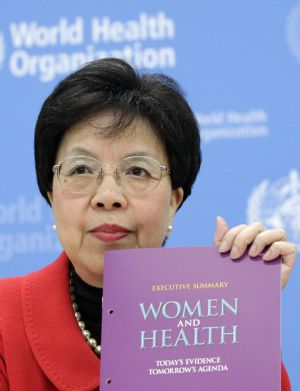highlights
WHO calls for women's health care reform
(Xinhua)
Updated: 2009-11-10 14:48

WHO Director-General Margaret Chan holds a copy of the "Women and Health" report during a news conference at the World Health Organization (WHO) headquarters in Geneva November 9, 2009. WHO is launching the "Women and Health: Today's Evidence, Tomorrow's Agenda" report which provides the latest and most comprehensive evidence available to date on women's specific needs and health challenges over their entire life-course.[Xinhua] |
GENEVA: The World Health Organization (WHO) called for girls' and women's healthcare reform on Monday in Geneva.
A WHO report titled "Women and health: today's evidence tomorrow's agenda" used current data to track the disparities in female health from newborns to adults over 60 years of age.
"If women are denied a chance to develop their full human potential, including their potential to lead healthier and at least somewhat happier lives, is society as a whole really healthy?" asked WHO Director-general Dr. Margaret Chan.
The report states that while women compose the bulk of health care providers, their own health needs often go unmet in the areas of sexual violence, cervical cancer screening and mental health. In addition, lower socio-economic status, which translates to lack of access to education, decision-making and income, limits women's ability to protect their own health, the study said.
The report advises creating opportunities for female leadership, designing health systems that better meet women's needs, leveraging changes in public policy to address how social and economic determinants of health adversely impact women, and building a better knowledge base.
The Geneva-based WHO was formed in 1948 and has 193 member states.










